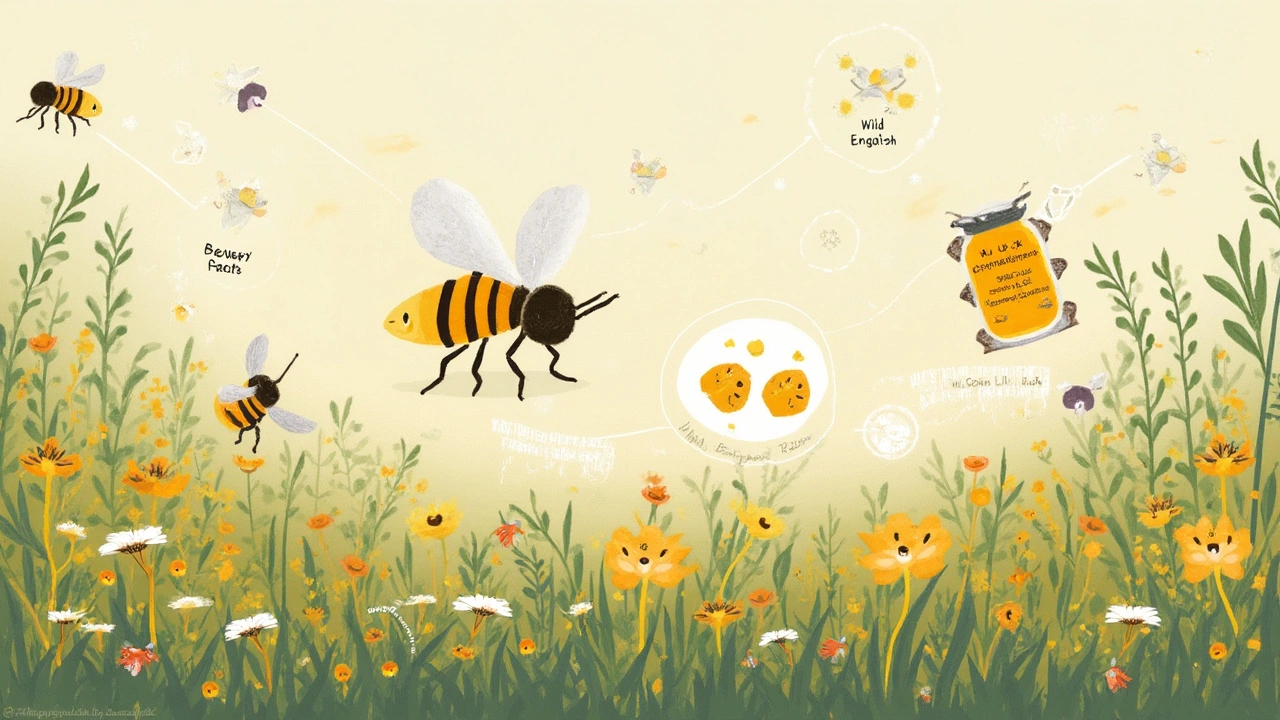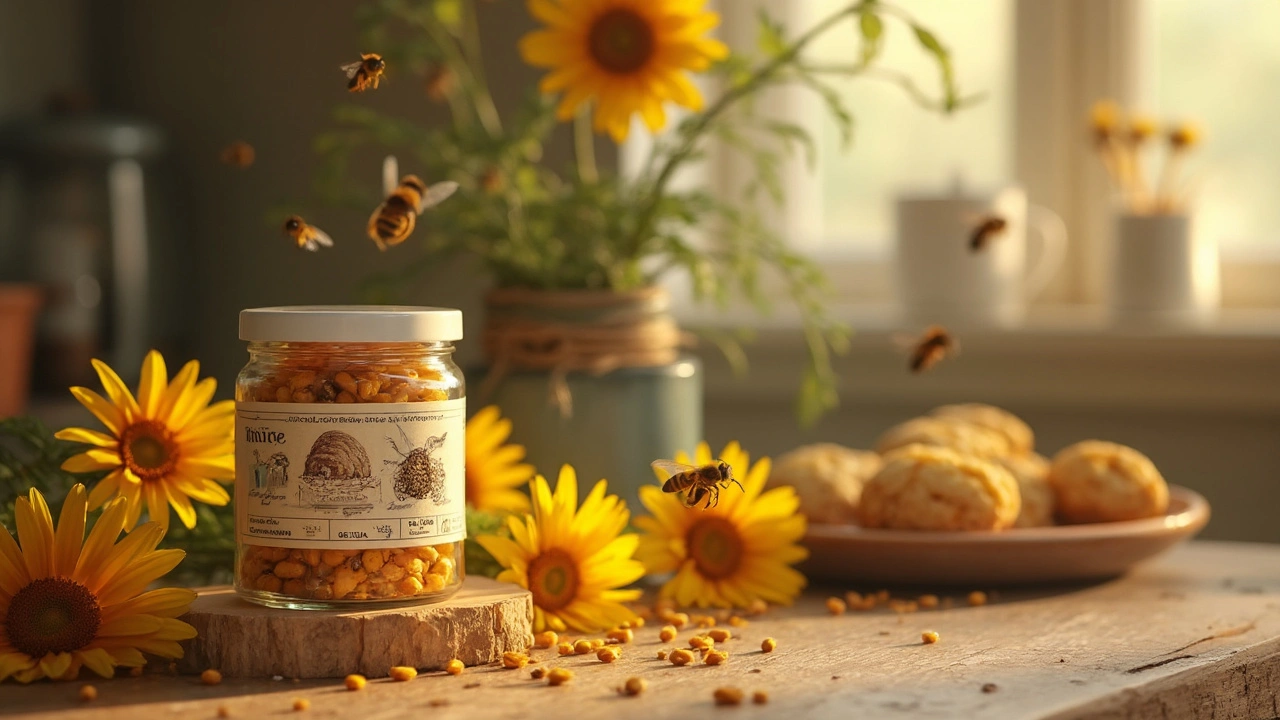Imagine something as simple as beeswax stirring up conversation at your kitchen table. That's what happened to me not long ago when my daughter Phoebe, known for her never-ending questions about everything, asked if "eating bee stuff" is good for you. Not exactly your everyday dad talk, right? But it got me thinking—when did beeswax stop being just for candles and suddenly turn up in smoothies and vitamin shops? There’s a buzz (pun totally intended) about beeswax dietary supplements, and it's not just beekeepers talking anymore. Whether you’ve glimpsed it in ingredient lists or seen influencers swear by it, beeswax is quietly shifting from hobby farm finds to health food aisles. The question on most people’s minds is, does it do anything for you—or is it yet another health fad built on honey-colored dreams?
What is Beeswax and How Do People Use It?
Let’s clear up some confusion—beeswax doesn’t mean honey. It’s that hard, yellowish stuff bees build their hexagonal honeycombs out of. About eight worker bees need a whole day to make a single gram of wax! Now, beeswax has always been handy for more than just housing honey. Ancient Egyptians coated mummies with it. The Romans shaped it into writing tablets. Grandma swears it’s her secret lip balm ingredient. But dietary supplements? That’s a newer twist. See, beeswax contains long-chain fatty acids, alcohols, and hydrocarbons. When broken down, it’s chemically different from things like honey or royal jelly.
You might see beeswax supplements sold as oil-filled capsules, chewable tablets, or as an ingredient in complex blends with things like propolis and pollen. Some brands market it for cholesterol support, while others claim it helps with digestion or joint health. The web is crawling with stories. Someone’s uncle swears it “cleansed his arteries,” and another says it settled her acid stomach after too much pizza. Don’t be fooled, though. There’s a world of difference between legends and what’s been proven in a lab.
Beeswax also gives structure to many other supplements and vitamins. It helps capsules hold their shape, makes pills easier to swallow, and keeps mixtures from separating. Sometimes you get beeswax on accident! But for actual beeswax supplements, manufacturers usually purify it, test it for pesticides, and sometimes mix it with things like fish oil or herbs. The way you take it—pills, softgels, chews—matters less than the purity and source.
One thing to watch: Most human bodies can’t really digest beeswax. It acts more like fiber, passing through you instead of breaking apart in your stomach. That’s why you often hear it compared to certain vegetable waxes, which just "slide on through" and do their work elsewhere. So, if your supplement promises miracle absorption, be skeptical.

What Are the Real Health Benefits of Beeswax Supplements?
This is where science steps up—or sometimes, steps back. First off, beeswax is loaded with esters and fatty acids. Studies at the University of Granada in Spain found these compounds can help form a barrier in the stomach, which slows the absorption of certain fats and sugars. But does this lower your cholesterol, as some supplement companies promise? The answer is complicated. One study in 2018 tracked people taking purified beeswax esters and found a small drop in LDL (“bad cholesterol”) after three months, but the change was less than what you’d get from fiber or statin drugs.
Beeswax also contains “aliphatic alcohols” from pollen and propolis, which attracted attention because they show anti-inflammatory effects in petri dish tests. A 2021 report in the journal Phytotherapy Research even highlighted a possible benefit for joint pain and arthritis. Still, these effects in actual humans are small, hard to consistently measure, and sometimes disappear when you up the dose. Most of the hype comes from preliminary animal research and old folk remedies passed down among bee enthusiasts.
Another claim is that beeswax eases digestive woes. Tiny clinical trials have explored this, showing mild improvement in bloating and regularity—not far off from what you’d expect from eating extra fiber. If you’re prone to constipation or “slow gut,” swapping some bee-based fiber might help, but don’t bet on it working miracles for IBS or serious digestive issues.
If you’re curious about antioxidants, beeswax really does have some. The wax naturally protects honey and stored pollen from spoiling in the hive. On a molecular level, it blocks free radicals—but in reality, the antioxidant content is low compared to fruits, veggies, or even honey itself.
For skin and oral health, topical beeswax is legendary—think lip balms, ointments, and dental polishes. Eaten, though, these benefits don’t quite translate. Most of the good stuff works better from the outside in. And before you buy into promises about immune-boosting “bee strength,” remember, most of that research focuses on propolis or royal jelly, not plain beeswax. Here’s how beeswax lines up next to other bee products and popular alternatives:
| Product | Main Nutrients/Components | Main Health Claims | Scientific Support Level |
|---|---|---|---|
| Beeswax | Esters, fatty acids, alcohols | Cholesterol, digestion, inflammation | Low-Moderate |
| Honey | Sugars, antioxidants | Cough relief, wound care, energy | Moderate-High |
| Propolis | Flavonoids, phenolics | Immune support, antibacterial | Moderate |
| Royal Jelly | Proteins, vitamins, fatty acids | Skin, menopause, aging | Low-Moderate |
Surprised that beeswax ranks lower for scientific backing? That’s because big, double-blind human trials are rare. Don’t get me wrong—there’s nothing harmful for most folks about purified beeswax in modest doses, and it can support healthy routines for some people. But if someone’s selling you miracle claims, check for published human research first.
Some supplement makers add flavor and colors to make beeswax more appealing. Always check the labels for fillers, added sugar, or synthetic flavors. The more “natural” or “raw” a beeswax supplement is, the less likely it’s been changed or heated so much that the beneficial compounds have broken down. Still, no supplement replaces balanced meals and exercise. If you’re allergic to bee stings or have severe pollen allergies, approach carefully—bee products of any kind may not be your friend.

Tips for Taking Beeswax Supplements Safely and Effectively
Thinking of trying beeswax supplements yourself? There’s a smart way to do it. First up, chat with your doctor—especially if you have allergies, take cholesterol meds, or have digestive conditions. If you’re pregnant or breastfeeding, there aren’t enough studies to say whether it’s safe, so better skip it unless your doctor gives the green light.
When picking a beeswax supplement, start with brands that show their sourcing. Is the wax from pesticide-tested hives? Was it filtered for impurities? It doesn’t matter how trendy or “artisan” the label is—what you want is proof it’s clean and well made. Labels that list “beeswax (cera alba)” as the main ingredient and show third-party testing are a plus. Avoid anything that says “proprietary blend” without ingredient amounts, since you don’t really know what’s inside.
How much should you take? Most studies use from 300mg to 2g daily. If you eat wax in food—think fruit with a shiny coating or fudge wrapped in wax—it’s a fraction of those amounts. Chewable types sometimes taste weird (no surprise), so go slow. Too much can affect regularity—sometimes for the better, sometimes not. I once tried a pea-sized piece out of curiosity, and let’s just say, my gut noticed.
- Start small: Try the lowest dose first and see how your system reacts.
- Check for allergic reactions: Hives, itching, or trouble breathing means stop right away.
- Stay hydrated: Like any fiber, beeswax may need extra water to move smoothly through your system.
- Don’t mix with laxatives: You want gentle results, not a sprint to the bathroom.
- Store supplements in cool, dry places to prevent clumping or melting.
Here’s the thing—dietary supplements don’t work like prescription drugs. You won’t wake up the next day and feel lighter, leaner, or stronger after a single dose. Changes, if any, are subtle and creep up over several weeks. Kids like Phoebe and Neville, always wanting to experiment, sometimes ask if grown-ups can take “super-bees supplements” to get superpowers. I wish it were that simple! If you want real, long-term improvements in health, think about supplementing whole foods and exercise with beeswax—not the other way around.
You might see marketing that doubles down on “holistic” healing. Be wary of phrases like “detoxifies the body” or “eliminates toxins.” There’s no strong science that beeswax extracts toxins in any dramatic way. Eat real, unprocessed food, drink plenty of water, use supplements as tools—not as substitutes.
Finally, keep track of how you feel if you start taking a beeswax supplement. Journal your digestion, mood, or energy. If you don’t notice any benefit after two or three months, it’s probably not right for you. Sometimes the best way to know if something works is just to pay attention to your own body, rather than chasing every new bottle on the shelf.
Remember, beeswax dietary supplements might be interesting, but they’re not magic bullets. If you enjoy the ritual, like what you feel, or just love supporting beekeepers, great. But don’t expect more than modest benefits, and keep asking questions—just like Phoebe. That’s how you really discover what works.






april kakoske
May 18, 2025 AT 01:23no science needed
Pradeep Meena
May 18, 2025 AT 05:14Rishabh Jaiswal
May 19, 2025 AT 00:01May Zone skelah
May 19, 2025 AT 18:55beeswax isn’t a supplement-it’s a metaphysical gesture toward harmony with the natural world, a silent ode to industriousness we’ve forgotten how to honor
we’ve turned wellness into a grocery aisle, but this? this is alchemy
and yet, the science says ‘meh’-how tragically human that we need numbers to validate beauty
Dale Yu
May 20, 2025 AT 07:31beeswax is plastic for your insides
if you think eating wax fixes cholesterol you might as well swallow a candle
and stop pretending you’re holistic when you’re just buying expensive glitter
Kshitij Nim
May 20, 2025 AT 19:28it's not magic but it's not poison either
focus on sleep, water, and movement first-supplements are just the icing, not the cake
Scott Horvath
May 21, 2025 AT 18:39after 3 weeks i noticed… nothing
but hey at least they tasted like honey and didn’t give me the runs
still think it’s a cool idea though-like nature’s chewing gum
Armando Rodriguez
May 22, 2025 AT 00:28beeswax supplements are not a replacement for evidence-based interventions, but they may serve as a low-risk adjunct for select individuals under medical guidance
the key is transparency, quality sourcing, and realistic expectations
jennifer sizemore
May 22, 2025 AT 10:09it’s like… here’s the truth, here’s the myth, here’s what you actually get
thank you for not turning this into a cult
matt tricarico
May 22, 2025 AT 19:18we’d rather swallow a wax pill than change our breakfast
Kimberly Ford
May 22, 2025 AT 19:40but most store-bought stuff? filtered with solvents, mixed with fillers
if you’re going to try it, go direct to a local beekeeper and ask for their testing reports
don’t trust the Amazon reviews
jerry woo
May 23, 2025 AT 01:41beeswax is the dietary equivalent of eating a candle to cure a hangover
you’re not detoxing-you’re just passing wax through your system like a tiny, golden brick
and yet somehow, people are writing blog posts like it’s the elixir of life
we’re not curing disease here-we’re just feeding the spiritual capitalism machine
but hey, if you feel better swallowing a wax pellet while listening to crystal bowls? more power to you
just don’t call it science